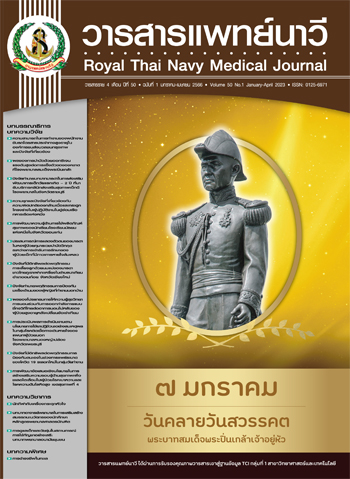Maternal Presence Experiences in Pediatric Intensive Care Unit during the Admission of Pediatric Patients with Respiratory Failure
Main Article Content
Abstract
The purpose of this phenomenological study was to describe the experience of maternal presence in a pediatric intensive care unit during the admission of pediatric patients with respiratory failure. Data were collected through nonparticipant observation and in-depth interviews to examine mothers with specific inclusion criteria who were continuously caring for pediatric patients with respiratory failure. Data were analyzed using Colaizzi's method by repeatedly reading the interview transcripts, coding the data, drawing a conclusion, and interpreting into key themes until the data were saturated from six informants.
The result showed that "Caring with a mother's heart" and "Feeling driven and maintaining the mother's care for her child" were the main themes as essential elements of maternal presence in pediatric intensive care. This can be used as foundational information to support maternal presence, including future research.
Article Details

This work is licensed under a Creative Commons Attribution-NonCommercial-NoDerivatives 4.0 International License.
References
Mittal A, Mittal K. Egan's fundamentals of respiratory care 12th ed. J Pediatr Crit Care 2021;8(6):306.
Alnajjar H, Elarousy W. Exploring family needs in neonatal and pediatric intensive care units at King Khaled Hospital-Jeddah. Clinical and Medical Investigations 2017;2(4):1-7.
Tavernier SS. An evidence-based conceptual analysis of presence. Holist Nurs Pract 2006;20(3):152-6.
O'Laughlin E, Ridley-Johnson R. Maternal presence during children's routine immunizations: The effect of mother as observer in reducing child distress. Child Health Care 1995;24(3):175-91.
Shaw K, Ritchie D, Adams G. Does witnessing resuscitation help parents come to terms with the death of their child? a review of the literature. Intensive Crit Care Nurs 2011;27(5):253-62.
Kumar BS, Avabratha KS. Parental stress: a study from a pediatric intensive care unit in Mangalore. IJCP 2015;2(4):401-5.
Foster K, Young A, Mitchell R, Van C, Curtis K. Experiences and needs of parents of critically injured children during the acute hospital phase: a qualitative investigation. Injury 2017;48(1):114-20.
Rattanapibun K, Kongsaktrakul C, Patoomwan A. Parent participation in the care of hospitalized children. Rama Nurs J 2011;17(2):233-47. (in Thai).
Hockenberry MJ, Rodgers CC, Wilson D. Study guide for Wong's essentials of pediatric nursing e-book. 11th ed. London: Elsevier Health Sciences; 2021.
Speziale HS, Streubert HJ, Carpenter DR. Qualitative research in nursing: advancing the humanistic imperative. 5th ed. Philadelphia: Lippincott Williams & Wilkins; 2011.
Yaemsuda T. Ethical issue in medical research and guideline for practice. Royal Thai Navy Medical Journal 2020;47(2):464-77. (in Thai).
Chantavanich S. Qualitative research. 24th ed. Bangkok: Chulalongkorn University Press; 2018. (in Thai).
Lareau A. Listening to people: a practical guide to interviewing, participant observation, data analysis, and writing it all up. Chicago: University of Chicago Press; 2021.
Morrow R, Rodriguez A, King N. Colaizzi’s descriptive phenomenological method. The Psychologist 2015;28(8):643-4.
Lincoln YS, Guba EG. Naturalistic inquiry. CA: Sage Publictions; 1985.
Matthew L, Matthew TJ. Defining presence. In: Matthew L, Frank B, Jonathan F, Wijnand IJ, Rachel JS, editors. Immersed in media: telepresence theory, measurement & technology. London: Springer; 2015. p. 13-34.
Saraswati P, Sunitha PS, Vidya M. Separation anxiety disorder. IJIN 2019;5(2):31-3.
Somthong K, Jirapaet V. Parental experience in decision making in bringing children with non-urgent medical conditions to the emergency department. Royal Thai Navy Medical Journal 2019;40(2):252-67. (in Thai).
Erdoğan Ç, Turan T, Pınar B. The effect of maternal voice for procedural pain in paediatric intensive care unit: a randomised controlled trial. Intensive Crit Care Nurs 2020;56:102767.
Yaemsuda T. Nurses: a voice to lead - health is a human right. Royal Thai Navy Medical Journal 2020;45(2):417-20. (in Thai).
Rennick JE, Lambert S, Childerhose J, Campbell-Yeo M, Filion F, Johnston CC. Mothers’ experiences of a touch and talk nursing intervention to optimise pain management in the PICU: a qualitative descriptive study. Intensive Crit Care Nurs 2011;27(3):151-7.
Soares LG, Rosa NM, Higarashi IH, Marcon SS, Molina RC. Pediatric ICU: the meaning of taking care in the mother's perspective. Revista de Pesquisa: Cuidado é Fundamental Online 2016;8(4):4965-71.
Swanson KM. Kristen Swanson’s theory of caring. [Internet]. [cited 2020 May 15]. Available from: https://www.studocu.com/en-us/document/maryville-university/theoretical-foundations-of-nursing-practice/kristen-swanson-theory/28958010.


